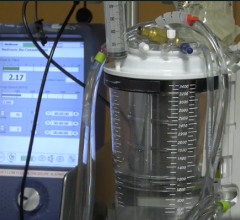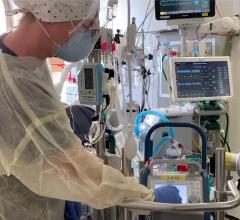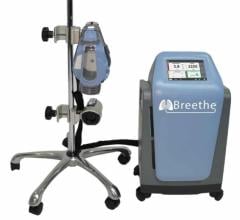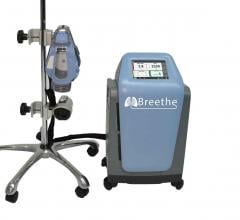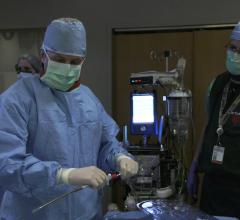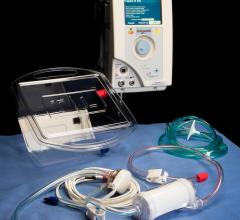
A nurse at Banner Health in Phoenix, Ariz., enters a room to adjust an ECMO unit being used to support a severely ill COVID-19 patient. A new study finds high levels of moral distress among clinicians who regularly care for patients receiving mechanical circulatory support such as ECMO.
September 13, 2021 — The growing use of mechanical circulatory support (MCS) may contribute to high levels of moral distress for clinicians who regularly care for critically ill patients receiving the aggressive, but life-sustaining therapy, according to a new study in American Journal of Critical Care, the journal of the American Association of Critical-Care Nurses.[1]
Over the past decade, MCS has expanded beyond being a bridge to transplantation to being used for both short- and long-term support ranging from hours to years, for a variety of indications and goals of care. It includes right and left ventricular assist devices and extracorporeal membrane oxygenation (ECMO).
Still considered a relatively new life-sustaining therapy, MCS may cause high prognostic uncertainty and unacceptable quality of life. Although survival rates are improving, complications such as debilitating stroke, significant bleeding and infection remain significant challenges for patients, their families and clinicians.
“Moral Distress in Clinicians Caring for Critically ill Patients who Require Mechanical Circulatory Support” is one of only a few studies that examine the prevalence of moral distress among clinicians caring for patients receiving MCS.
An interdisciplinary team from Columbia University Irving Medical Center in New York City surveyed clinicians who commonly care for patients receiving MCS about their levels of moral distress. The final study sample comprised 102 clinicians (67 nurses, 28 physicians and seven advance practice providers) from the hospital’s medical and cardiothoracic intensive care units (ICUs).
Co-author May Hua, M.D., MS, is a board certified anesthesiologist and intensivist at the hospital, as well as an assistant professor of anesthesiology in Columbia’s medical school and its school of public health.
“Moral distress has been shown to arise in situations when clinicians feel compelled to provide aggressive care with unclear benefit. During the pandemic, clinicians have turned to MCS as a rescue therapy for patients with COVID-19, and its increased use may lead to more morally distressing clinical care,” Hua said. “Our findings suggest that use of MCS may be an additional factor to consider when assessing the health of the work environment and how it may affect ICU clinicians’ moral distress and well-being.”
The survey included questions with patient archetypes to represent patient populations commonly encountered in the ICU, allowing the researchers to assess how often clinicians viewed caring for patients receiving MCS as a morally distressing situation, compared with caring for a “routine” patient or for patients requiring a different life-sustaining therapy.
Clinicians were significantly more likely to report frequent moral distress when caring for patients receiving either temporary or permanent MCS than when caring for other critically ill patients, such as a routine postoperative patient. Intriguingly, despite the overall high levels of moral distress, clinicians were less likely to report frequent moral distress when caring for patients receiving MCS than when caring for either patients with chronic critical illness or a sustained multi-system organ failure.
In addition, moral distress was higher among nurses than among physicians and advance practice providers. Moral distress was also higher for clinicians with more than 10 years of experience, which may be due to a “crescendo effect” with repeated instances of unaddressed moral distress resulting in a greater level of moral distress over time. Moral distress was significantly higher for those who also reported burnout and for those considering leaving their position.
When asked to rank potential strategies whose increased use would be most useful to reduce moral distress, 75% of all respondents identified palliative care consultations as most useful. More than 60% of respondents also chose ethics consultations and debriefing sessions as effective interventions.
Find more ECMO technology news
Reference:

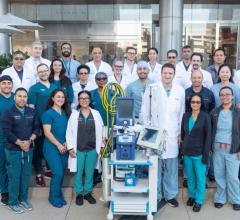
 September 13, 2023
September 13, 2023 

